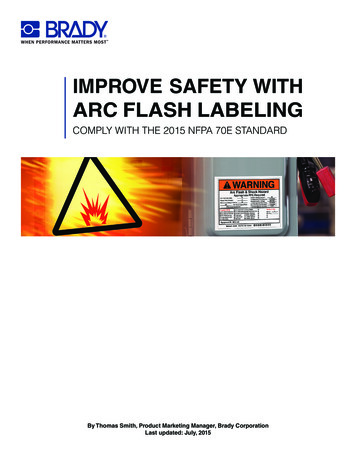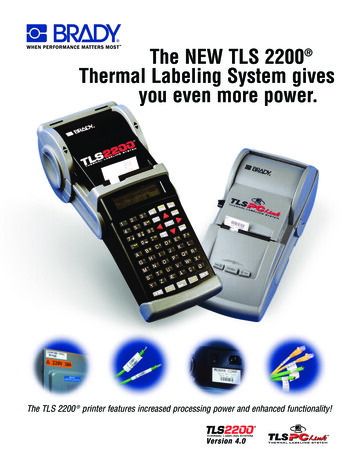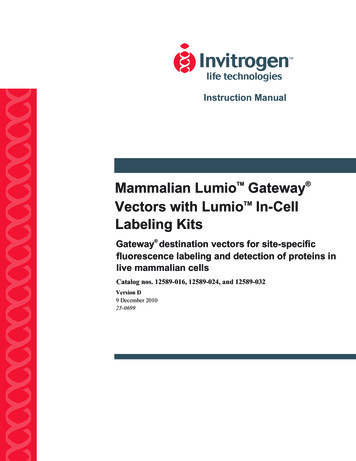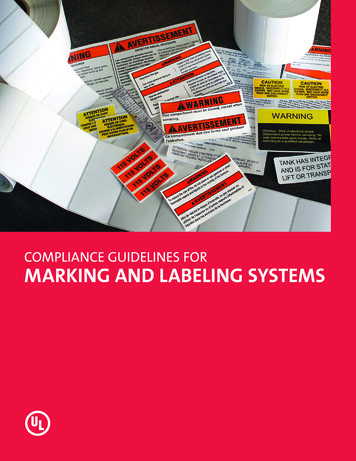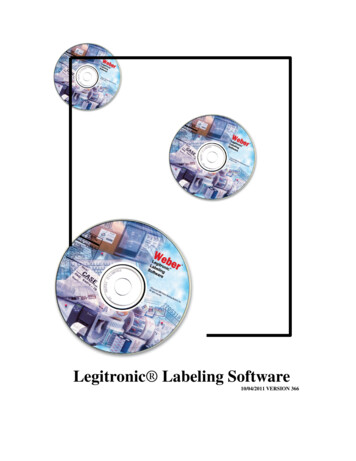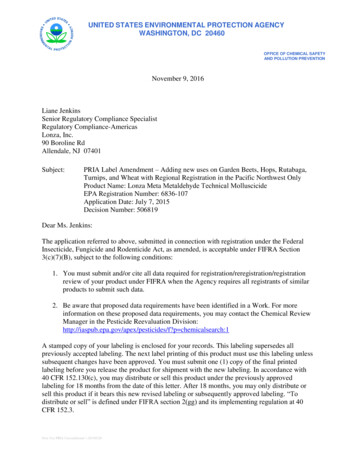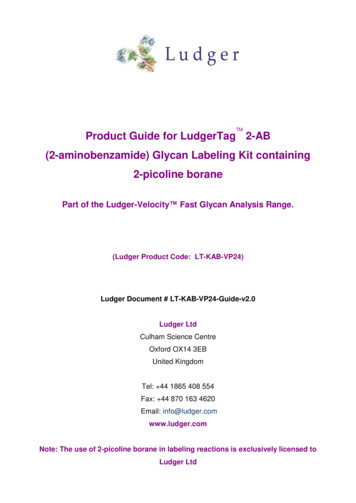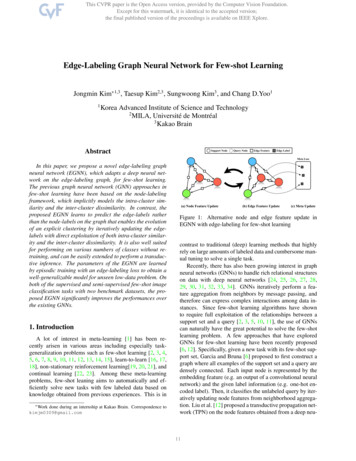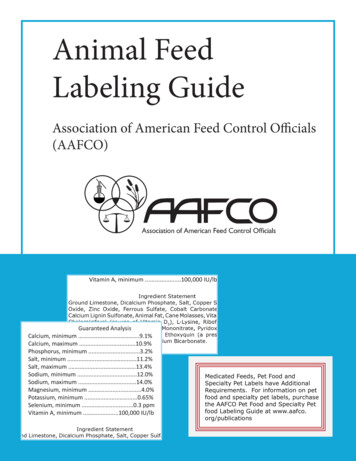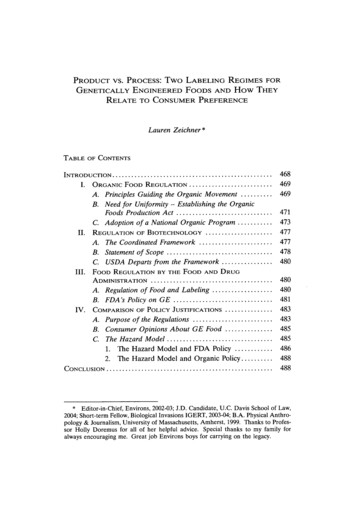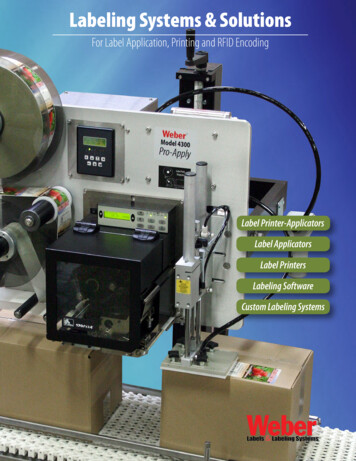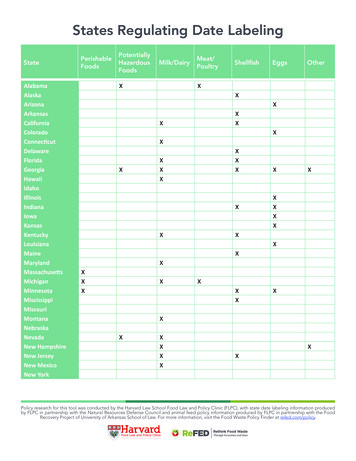
Transcription
States Regulating Date issouriMontanaNebraskaNevadaNew HampshireNew JerseyNew MexicoNew XXXXXXXXXXXXXXXXXXXXXXXXXXXXPolicy research for this tool was conducted by the Harvard Law School Food Law and Policy Clinic (FLPC), with state date labeling information producedby FLPC in partnership with the Natural Resources Defense Council and animal feed policy information produced by FLPC in partnership with the FoodRecovery Project of University of Arkansas School of Law. For more information, visit the Food Waste Policy Finder at refed.com/policy.
States Regulating Date LabelingStateNorth CarolinaNorth DakotaOhioOklahomaOregonPennsylvaniaRhode IslandSouth CarolinaSouth ashington, D.C.West XXXXXOtherXXXXXXXXXXXXXXXXXXXXXXXPolicy research for this tool was conducted by the Harvard Law School Food Law and Policy Clinic (FLPC), with state date labeling information producedby FLPC in partnership with the Natural Resources Defense Council and animal feed policy information produced by FLPC in partnership with the FoodRecovery Project of University of Arkansas School of Law. For more information, visit the Food Waste Policy Finder at refed.com/policy.
States Regulating Food SalesPast Some Label DatesPast-DateSalesRegulatedFoods for which Sale After Date is RestrictedXmeat, Class A foods (baby food, infant formula, potentiallyhazardous foods)XeggsXshellfish and milk/ dairyXeggs, infant formula, shellfish, milk, potentially hazardousfoods, pre-packaged sandwichesXeggsXmilk/milk productsXmilkMassachusettsXAll food products (special focus on perishable and semiperishable foods)MichiganXPre-packaged perishable foods, meat, milk/dairyXmilkXPotentially hazardous iMontanaNebraskaNevadaXXXXXXXXXXXPolicy research for this tool was conducted by the Harvard Law School Food Law and Policy Clinic (FLPC), with state date labeling information producedby FLPC in partnership with the Natural Resources Defense Council and animal feed policy information produced by FLPC in partnership with the FoodRecovery Project of University of Arkansas School of Law. For more information, visit the Food Waste Policy Finder at refed.com/policy.
States Regulating Food SalesPast Some Label DatesStateNew HampshireNew JerseyNew MexicoNew YorkNorth CarolinaNorth DakotaOhioOklahomaOregonPennsylvaniaRhode IslandSouth CarolinaSouth oRegulationXXXPre-wrapped sandwichesmilkmilk/dairyXXXPackaged perishable foodsmilkPackaged bakery productsXXDairyPerishable packaged foodsXPotentially hazardous foods, dairy, meat, poultry, fish,bread products, eggs, cold meats, packaged perishablefoods, etc.XeggsXXXXXXXWisconsinWyomingFoods for which Sale After Date is RestrictedXXXXXWashington, D.C.West VirginiaPast-DateSalesRegulatedXPolicy research for this tool was conducted by the Harvard Law School Food Law and Policy Clinic (FLPC), with state date labeling information producedby FLPC in partnership with the Natural Resources Defense Council and animal feed policy information produced by FLPC in partnership with the FoodRecovery Project of University of Arkansas School of Law. For more information, visit the Food Waste Policy Finder at refed.com/policy.
State Liability Protection LawsProtectionsApply When EndRecipient Paysfor theCivil CriminalDonated FoodType ofProtectionStateCitationAlabamaAla. Code 1975 § 20-1-6xxAlaskaAlaska Stat. § 17.20.346xxArizonaAriz .Rev. Stat. Ann. § 36-916xArkansasArk. Code Ann. § 20-57-103xCaliforniaCal. Civ.Code § 1714.25xColoradoColo. Rev. Stat. § 13-21-113xxConnecticutConn. Gen. Stat. Ann. § 52-557LxxDelawareDel.Code Ann. Tit. 10, § 8130xxDistrict ofColumbiaD.C. Code § 48-301xxFloridaFla. Stat. Ann. § 768.136xxGeorgiaGa. Code Ann. § 51-1-31xxHawaiiHaw. Rev. Stat. § 145D-1—D-5xxIdahoIdaho Code Ann. § 6-1301—1302xxIllinois745 Ill. Comp. Stat. 50/1—50/4xIndianaInd. Code § 34-30-5-1—34-30-5-2xIowaIowa Code Ann. § 672.1xxKansasKan. Stat. Ann. § 65-687xxKentuckyKy. Rev. Stat. § 413.247—248xxLouisianaLa. Rev. Stat. Ann. § 9:2799xMaineMe. Rev. Stat. tit. 14, § 166xMarylandMd. Code Ann. Cts. & Jud. Proc. § 5-634Md. Code Ann. Health—Gen. § 21-322xMassachusettsMass. Gen. Laws Ann. Ch. 94, § 328;105 Mass. Code Regs. 520.119xxMichiganMich. Comp. Laws Ann. § 691.1572xxxxxProtectionsApply toDirectDonationsxxxxxOnly wildgame**Policy research for this tool was conducted by the Harvard Law School Food Law and Policy Clinic (FLPC), with state date labeling information producedby FLPC in partnership with the Natural Resources Defense Council and animal feed policy information produced by FLPC in partnership with the FoodRecovery Project of University of Arkansas School of Law. For more information, visit the Food Waste Policy Finder at refed.com/policy.
State Liability Protection LawsProtectionsApply When EndRecipient Paysfor theCivil CriminalDonated FoodType ofProtectionStateCitationMinnesotaMinn. Stat. Ann. § 604A.10xMississippiMiss. Code Ann. § 95-7-1xMissouriMo. Rev. Stat. § 537.115xxMontanaMont. Code Ann. § 27-1-716xxNebraskaNeb. Rev. Stat. § 25-21,189xNevadaNev. Rev. Stat. § 41.491xNew HampshireN.H. Rev. Stat. § 508:15xxxNew JerseyN.J. Stat. Ann. § 24:4A-1—A5xxxNew MexicoN.M. Stat. Ann. § 41-10-1—3xxNew YorkN.Y. Agric. & Mkts. Laww § 71-y—zxxNorth CarolinaxxxxOhioN.C. Gen. Stat. Ann. § 99B-10N.D. Cent. Code § 19-05.1-02—19-05.105Ohio Rev. Code Ann. § 2305.37OklahomaOkla. Stat. Ann. tit. 76, § 5.6xxxOregonOr. Rev. Stat. § 30.890xxxPennsylvania10 Pa. Stat. Ann. § 351-58xxRhode IslandR.I. Gen. Laws Ann. § 21-34-1—2xxSouth CarolinaS.C. Code Ann. § 15-74-10—40xxSouth DakotaS.D. Codified Laws § 39-4-22—24xxTennesseeTenn. Code Ann. § 53-13-101—103Tex. Civ. Prac. & Rem. Code Ann. §76.001—004xxxxUtahUtah Code Ann. §§ 4-34-5, § 78B-4-502xxVermontVt. Stat. Ann. tit. 12, § 5761—5762xxVirginiaVa. Code Ann. § 3.2-5144xNorth DakotaTexasProtectionsApply toDirectDonationsxx*xxxxx**xPolicy research for this tool was conducted by the Harvard Law School Food Law and Policy Clinic (FLPC), with state date labeling information producedby FLPC in partnership with the Natural Resources Defense Council and animal feed policy information produced by FLPC in partnership with the FoodRecovery Project of University of Arkansas School of Law. For more information, visit the Food Waste Policy Finder at refed.com/policy.
State Liability Protection LawsProtectionsApply When EndRecipient Paysfor theCivil CriminalDonated FoodType ofProtectionStateCitationWashingtonWash. Rev. Code Ann. § 69.80.031xxWest VirginiaW. Va. Code, § 55-7D-1—4xxWisconsinWis. Stat. Ann. § 895.51xWyomingWyo. Stat. Ann. § 35-7-1301xProtectionsApply toDirectDonations*Food recovery organization must distribute the food for free in order to receive protection; donor isprotected even if the food recovery organization charges**Explicitly allows donation of past-date food, as long as the food is wholesome, separated from foods thatare not past-date, and clearly labeled as past-datePolicy research for this tool was conducted by the Harvard Law School Food Law and Policy Clinic (FLPC), with state date labeling information producedby FLPC in partnership with the Natural Resources Defense Council and animal feed policy information produced by FLPC in partnership with the FoodRecovery Project of University of Arkansas School of Law. For more information, visit the Food Waste Policy Finder at refed.com/policy.
State Tax Incentives for Food DonationsLegislationArizonaAriz. Rev. Stat.Ann. § 425074ArizonaAriz. Rev. Stat.Ann. § 431025Deductionor creditDeductionDeductionBenefitGrossproceeds ofsales or grossincome fromdonated foodFull wholesalemarketprice, or themost recentsale price(whicheveris greater) ofdonated cropsEligible donorsRestaurantsTaxpayer engagedin the businessof farming orprocessingagricultural cropsTaxpayerresponsible forplanting, managing,and harvestingcropsTaxpayer engagedin the businessof processing,distributing, orselling agriculturalproductsCaliforniaCal. Rev. &Tax. Code§ 17053.88Credit10% ofinventory costCaliforniaCal. Rev. &Tax. Code§ 17053.12Credit50% oftransportationcostsCredit25% ofwholesalemarket price,up to 5,000annuallyAll taxpayersCredit25% ofwholesalemarket price,up to 1,000annuallyC-CorporationsColoradoColo. Rev.Stat. § 39-22536ColoradoColo. Rev.Stat. Ann. §39-22-301Eligible foodEligible recipientsPrepared food, drink,or condimentNonprofits thatregularly serve freemeals to the needyand indigent at nocostAgricultural cropsNonprofits locatedin Arizona whoseuse of the crop isrelated to their taxexempt statusFresh produceAgricultural cropsFood banks locatedin CaliforniaNonprofitsAgricultural crops(grains, fruit,vegetables), livestock,eggs, dairyNonprofit hungerrelief charitableorganizationsCrops and livestockCharitableorganizations thatdo not collectmoney, otherproperty, or servicesin exchange forproductPolicy research for this tool was conducted by the Harvard Law School Food Law and Policy Clinic (FLPC), with state date labeling information producedby FLPC in partnership with the Natural Resources Defense Council and animal feed policy information produced by FLPC in partnership with the FoodRecovery Project of University of Arkansas School of Law. For more information, visit the Food Waste Policy Finder at refed.com/policy.
State Tax Incentives for Food DonationsLegislationDistrict ofColumbiaD.C. Code§ 47-1806.14IowaIowa Code§§ 190B.101.106, 422.11E,422.33(30)KentuckyKy. Rev.Stat. Ann. §141.392MissouriMo. Rev. Stat.§ 135.647OregonOr. Rev. Stat.§ 315.154 and315.156SouthCarolinaS.C. CodeAnn. § 12-63750VirginiaVA CodeAnn. § 58.1439.12:12Deductionor creditBenefitEligible donorsEligible foodEligible recipientsCredit50% of thevalue ofthe foodcommoditydonation,up to 2,500annuallyAll taxpayersFood Commodities(vegetables, fruits,grains, mushrooms,honey, herbs, nuts,seeds, or rootstockgrown in the Districtby urban farmingor by a communitygarden)District of Columbiafood banks orshelters recognizedas a tax-exemptorganizationCredit15% of fairmarket value,up to 5,000annuallyTaxpayers thatproduce a foodcommodityAny apparentlywholesome foodFood banks andemergency feedingorganizationsCredit10% of fairmarket valueTaxpayer whoderives incomefrom agriculturalproductsEdible agriculturalproductsNonprofit foodprograms operatingin KentuckyCredit50% of food orcash donation,up to 2,500annuallyAll taxpayersCash or food that isnot past-dateLocal food pantriesin the area wherethe donor resides inMOCredit10% ofwholesalemarket priceTaxpayer orcorporation thatgrows crops orlivestockCrops and livestockFood bank orother charitableorganization in ORthat distributes foodwithout chargeCredit 75 percarcassLicensed meatpacker, butcher, orprocessing plantDeerNonprofits engagedin distributing foodto needy; no portionof deer can be soldCredit30% of fairmarket value,up to 5,000annuallyFood crops (grains,fruits, nuts, orvegetables)Nonprofit food bankengaged in providingfood to the needy;food can be sold tothe needy or othernonprofitsAny personengaged in thebusiness of farmingPolicy research for this tool was conducted by the Harvard Law School Food Law and Policy Clinic (FLPC), with state date labeling information producedby FLPC in partnership with the Natural Resources Defense Council and animal feed policy information produced by FLPC in partnership with the FoodRecovery Project of University of Arkansas School of Law. For more information, visit the Food Waste Policy Finder at refed.com/policy.
State Laws for Feeding Food Scraps to MissouriMontanaNebraskaNevadaNewHampshireSpecific Food ntsFullprohibitionon animal/veg. wasteAnimal andveg. mustbe heattreatedLicenserequired toheat-treatwasteFullprohibitionon animalwaste onlyAnimalwaste mustbe heattreatedIndividualUse Regs.Licenserequired tofeed wasteto swineLicenseMay feedrequired for householdbothgarbage toown XXXXXXXXXXXXXXXXXXXXXXXXXPolicy research for this tool was conducted by the Harvard Law School Food Law and Policy Clinic (FLPC), with state date labeling information producedby FLPC in partnership with the Natural Resources Defense Council and animal feed policy information produced by FLPC in partnership with the FoodRecovery Project of University of Arkansas School of Law. For more information, visit the Food Waste Policy Finder at refed.com/policy.
State Laws for Feeding Food Scraps to Swine*StateNew JerseyNew MexicoNew YorkNorth CarolinaNorth DakotaOhioOklahomaOregonPennsylvaniaPuerto RicoRhode IslandSouth CarolinaSouth onWest VirginiaWisconsinWyomingSpecific Food ntsFullprohibitionon animal/veg. wasteAnimal andveg. mustbe heattreatedLicenserequired toheat-treatwasteFullprohibitionon animalwaste onlyAnimalwaste mustbe heattreatedIndividualUse Regs.Licenserequired tofeed wasteto swineXXXXLicenserequiredfor bothXXXXXXXXXXXXXXXXXXXXXXXXXXXXXXXXXXXXXXMay feedhouseholdgarbage toown swineXXXXXXXXXXXX*The following states also regulate the feeding of food scraps to other animals, such as cattle and poultry: California,Georgia, Illinois, Iowa, Kansas, Massachusetts, Michigan, Minnestoa, nebraska, Nevada, New Jersey, New York,Pennsylvania, Puerto Rico, South Dakota.**Note that some states provide not that garbage must be “heat-treated,” but rather that it must be treated in otherways (i.e., “processed”) before it can be fed to livestock.*** Alaska and Utah have no regulations.Policy research for this tool was conducted by the Harvard Law School Food Law and Policy Clinic (FLPC), with state date labeling information producedby FLPC in partnership with the Natural Resources Defense Council and animal feed policy information produced by FLPC in partnership with the FoodRecovery Project of University of Arkansas School of Law. For more information, visit the Food Waste Policy Finder at refed.com/policy.
State Organic Waste Bans & Recycling LawsCurrently in EffectConnecticutConn. Gen.Stat. Ann. §22a-226eVermontVt. Stat. Ann. tit. 10,§ 6605kMassachusetts310 Mass. CodeRegs. 19.017Rhode IslandR.I. Gen. Laws Ann.§ 23-18.9-17Commercialfoodwholesaler ordistributor,industrialfoodmanufactureror processor,supermarket,resort orconferencecenter.Any tion,unincorporatedassociation, jointventure, trust,municipality, theState of Vermontor any agency,department, orsubdivision of theState, federal agency,or any other legal orcommercial entity.Any individual,partnership,association,firm, company,corporation,department,agency, group,public body(including acity, town,district, county,authority, state,federal, or othergovernmentalunit).Commercial foodwholesaler ordistributor, industrialfood manufactureror processor,supermarket, resortor conferencecenter, banquet hall,restaurant, religiousinstitution, militaryinstallation, prison,corporation, hospitalor other medicalcare institution,casino, and coverededucational facility.1 ton/week*WasteProductionThresholdto beCovered2014: 104tons/year2020: 52tons/year2014: 104 tons/year2015: 52 tons/year2016: 26 tons/years2017: 18 tons/year2020: Food scrapsbanned from landfillcompletely*Generatorsare coveredonly for weeksduring whichthey meet thethreshold2016: 104 tons/year2018: 52 tons/year for coverededucational facilitiesDistanceExemptions20 miles20 milesNone15 milesFood WasteGeneratorsCoveredCaliforniaCal. Pub.Res. Code §42649.81Any business,meaning acommercial orpublic entitysuch as a firm,partnership,corporation,or associationorganized asa for-profitor nonprofit entity.Multifamilyresidentialdwellings areexempted.2016: 8 cubicyards perweek2017: 4 cubicyards perweek2020: 2 cubicyards per weekIF statewideorganic wastedisposal hasnot beenreduced to50% of thelevel in 2014.None (butthere areexemptionsfor ruraljurisdictions)Policy research for this tool was conducted by the Harvard Law School Food Law and Policy Clinic (FLPC), with state date labeling information producedby FLPC in partnership with the Natural Resources Defense Council and animal feed policy information produced by FLPC in partnership with the FoodRecovery Project of University of Arkansas School of Law. For more information, visit the Food Waste Policy Finder at refed.com/policy.
State Organic Waste Bans & Recycling LawsCurrently in EffectConnecticutConn. Gen.Stat. Ann. §22a-226eOtherVermontVt. Stat. Ann. tit.10, § 6605kMassachusetts310 Mass. CodeRegs. 19.017Rhode IslandR.I. Gen. Laws Ann.§ 23-18.9-17CaliforniaCal. Pub.Res. Code §42649.81Waiver from theabove requirementsif the landfill tippingfee is less thanthe fee chargedby an authorizedcomposting oranaerobic digestionfacility located within15 miles of thebusiness.Policy research for this tool was conducted by the Harvard Law School Food Law and Policy Clinic (FLPC), with state date labeling information producedby FLPC in partnership with the Natural Resources Defense Council and animal feed policy information produced by FLPC in partnership with the FoodRecovery Project of University of Arkansas School of Law. For more information, visit the Food Waste Policy Finder at refed.com/policy.
Minnesota Minn. Stat. Ann. § 604A.10 x x Mississippi Miss. Code Ann. § 95-7-1 x Missouri Mo. Rev. Stat. § 537.115 x x Montana Mont. Code Ann. § 27-1-716 x x x Nebraska Neb. Rev. Stat. § 25-21,189 x * Nevada Nev. Rev. Stat. § 41.491 x x New Hampshire N.H. Rev. Stat. § 508:15 x x x x New Jersey N.J. Stat. Ann. § 24:4A-1—A5 x x x
